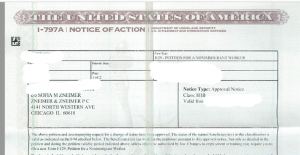Automatic EAD Extension
The Chicago immigration law team of Zneimer & Zneimer alerts our clients that the DHS has increased the automatic extension validity period for expiring Employment Authorization Documents. The automatic extension period is increased to up to 540 days for all eligible classes who properly filed their renewal application on or before October 26, 2023. Such automatic extension period will automatically terminate the earlier of up to 540 days after the expiration date of the Employment Authorization Document (Form I–766, or successor form) or upon issuance of notification of a denial on the renewal request, even if such date is after October 26, 2023. Those whose automatic extension expired before May 4, 2022, will receive an automatic resumption of employment authorization and the validity of their Employment Authorization Document, as applicable, for an additional period beginning from May 4, 2022, and up to 540 days from the expiration of their employment authorization and/or Employment Authorization Document as shown on the face of such document.
An Employment Authorization Document that has expired on its face is considered unexpired when combined with a Notice of Action (Form I–797C), which demonstrates that the requirements have been met, notwithstanding any notations on such notice indicating an automatic extension of up to 180 days.
Categories Eligible for Automatic Extensions
Not all categories receive the benefit of automatic extension. For example, people who have EAD as H-4 spouses are not eligible for the automatic extension. To receive the automatic extension, the application must be:
- Properly filed before the expiration date shown on the face of the Employment Authorization Document, or for EADs based on Temporary Protected Status, during the filing period described in the applicable Federal Register notice regarding procedures for obtaining Temporary Protected Status-related EADs;
- Based on the same employment authorization category as shown on the face of the expiring Employment Authorization Document or is for an individual approved for Temporary Protected Status or whose EAD was issued pursuant to TPS status; and
- Based on a class whose eligibility to apply for employment authorization continues notwithstanding expiration of the Employment Authorization Document and is based on an employment authorization category that does not require adjudication of an underlying application or petition before adjudication of the renewal application.





